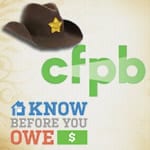If you haven’t heard, we now have a Consumer Financial Protection Bureau.
You may wonder why? What does it do? How can you use it? Good questions!
Why?
This has been needed for a long time. The CFPB describes itself as a neighborhood cop on the beat, supervising banks, credit unions, and other financial companies. Although we have consumer protection laws in place, there was no central policing agency for consumers to turn to when they faced unfair practices, or even illegal actions, from lenders.
There are many David and Goliath stories out there. Too often, when you have a financial problem, you’re the little guy against a big immovable corporation. You may have seen the news story about the foreclosure on a house with no mortgage. How can a bank seize your house if you don’t owe any money on it? A good question. This man literally had no one on his side until he turned to a local news station.
Hopefully, the days of fighting unwinnable battles are over. Thanks to the Dodd-Frank Wall Street Reform and the Consumer Protection Act of 2010, the CFPB is here to help. Hurray!
What does it do?
Its mission is to educate consumers (you), enforce the current Federal consumer financial laws, and study the actions of consumers, financial service providers, and the markets.
Education. If you know what you’re getting, you’ll make better choices. The CFPB believes “An informed consumer is the first line of defense against abusive practices.” You may say, “I don’t want an education, I just want the terms of my loan to be easy to understand.” They’re working on that, too. Most of us didn’t major in finance and we shouldn’t need a financial degree to understand the terms of our mortgage.
Enforce current laws. As mentioned above, we need a powerful advocate on our side. Unfortunately, it’s not enough that the laws are in place. We need someone to enforce them because the banks and credit card companies haven’t been willing to follow rules meant to protect their customers.
Study. The CFPB will study consumers, banks and the markets, so they can learn what the current problems are, how best to address them, and keep us informed on new risks.
How can you use it?
The CFPB actually wants you to use it, and they’ve made it easy with their interactive website. You can voice your opinions, submit complaints and learn more about finances.
Tell your story. They want your stories, good or bad, whether you’re an employee or a consumer. They want to know what people are up against. They want to know what doesn’t work and what does.
Vote on new practices. Right now they are looking for consumer opinions about simplifying mortgage paperwork. This is so needed. Having been in the mortgage field for many years, and having dealt with the numerous disclosures, I know how confusing it can be. The website is asking you to cast your vote for a disclosure with all the costs listed. Take a look and vote.
There is also a section for you to submit a complaint on a problem you have with your credit card company. They will forward your issue, give you confirmation, and keep you updated. So the next time you feel you are not getting your issue resolved, you might want to have the Consumer Financial Protection Bureau assist you.
They’re still a new agency, so we won’t expect miracles anytime soon. The best way to protect yourself is to do your research ahead of time so you can make informed choices. You can do that by following Quick Tips and passing it on to your friends. And don’t forget to bookmark www.consumerfinance.gov, the CFPB website.





 You have all heard me talk about FICO scores and how important they are to your financial health. I’m going to walk you through a scenario so you can see how FICO affects you.
You have all heard me talk about FICO scores and how important they are to your financial health. I’m going to walk you through a scenario so you can see how FICO affects you.